
BLOG
Truth time: the sweetest moments make boring stories
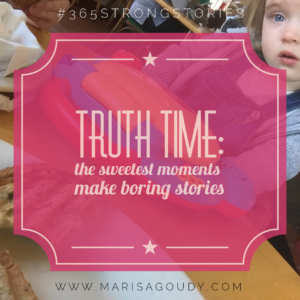 Spontaneously, I loaded my two year-old into the car and drove north. We would travel over an hour to a small town with a gigantic children's consignment sale. Big sister missed the adventure because was off at school, but we'd make it up to her with an entirely new wardrobe for the next school year.
And then, my little one and I headed to a perfect little gluten free bakery and feasted on sandwiches and cookies. Actually, her cookie was free because they thought my kid was so darn cute.
Spontaneously, I loaded my two year-old into the car and drove north. We would travel over an hour to a small town with a gigantic children's consignment sale. Big sister missed the adventure because was off at school, but we'd make it up to her with an entirely new wardrobe for the next school year.
And then, my little one and I headed to a perfect little gluten free bakery and feasted on sandwiches and cookies. Actually, her cookie was free because they thought my kid was so darn cute.
It was a rare Friday when I let work melt away. The multitasking I did was the usual mom stuff, not the crazed mompreneur stuff. I sized up jeans and picked through special occasion shoes while trying to keep a toddler from filching any toys. It was blissful.
What a beautifully boring story! In fact, it's not a story at all.
At best, it's an Instagram caption. You might feel connected enough with me to be happy that I enjoyed this sweet little oasis in the midst of the mess.
At worst, it's a self-congratulatory status update. You dismiss it as just another mompreneur spreading her sunshine about her wonderfully well-balanced life. Who cares if it's true. It just feels like white noise.
To make this into a story, I'd need to steal the sweetness of the moment
This really was a crazy nice day. My eyes welled with tears as I just let my love for my little girl wash over me.
And yet, I was painfully aware of how fleeting this all was and how quickly my six year-old had outgrown these spontaneous excursions with mama. If I let myself blink, I might find that four years have passed and I'm a mother of elementary school kids and I'm all alone on Friday mornings. My chest tightened just to think of it. (And I dismissed all the stress around "I never have enough time to work!" because that is a whole separate issue.)
I don't want to cast a shadow over this experience. I want to remember April 15, 2016 as pure and perfect (especially since we had gotten our taxes done in February!).
But, if I wanted to dig deeper, get real, and find a story in this outing I'd offer up Brene Brown's ideas about "foreboding joy." After all, there's a heck of a lot of juicy material in:
When we spend our lives (knowingly or unknowingly) pushing away vulnerability, we can't hold space open for the uncertainty of risk, and emotional exposure of joy. (Daring Greatly)
That's where the story worth blogging about is hiding - it's in the inner conflict I experienced. Lucky for me, it's my job to teach you about story, not about navigating the contradictions of parenthood. (I'll leave it to you to write into the rich and difficult topic of foreboding joy and the other worries that threaten the sweetest of days - goodness knows this story proves we parents need help figuring all that out!)
In the new content writing class You, Your Stories, and Your Audience we dive deep into how to tell the difference between compelling story and just a bunch of words. Learn more and join me!
“Share what is vulnerable, not what is intimate.”
Share what is vulnerable, not what is intimate - Brene Brown | #365StrongStories by Marisa Goudy | writing coach for therapists, coaches, healers, thought leaders
"I don't share anything until my feelings and growth aren't still dependent on it."
- Brené Brown
A slide with this quote on it lit up the chat box during the recent Story Triangle webinar.
We were deep into our exploration of what makes stories work and what makes them fall flat. At this point in the class, we were talking about how a story loses its balance when you, the writer, get lost in the details of your own story.
It's almost always a struggle, deciding what story elements add depth and what's going too deep.
As I hit publish, I’m grateful to have Brené to look to when I worry “Is this TMI?
After all, when writing is both your private, emotional processing tool and the way you communicate publicly and professionally, it can feel like a tightrope walk.
How do you tell the difference between a rich, compelling story and simply pouring out your guts?
Again, there’s a Brené quote for that. (Isn’t there a BB line for just about everything related to relationships and speaking truth?)
“Share what is vulnerable, not what is intimate.”
Sharing vulnerable stories reveals your humanity and creates connections.

Pouring out the intimate details into a public space where people who aren’t prequalified to hold you in all your glorious imperfection…
At best, you get no response at all. At worst, potential clients judge what they do not understand, turn away, and seek out someone who they believe is more in control of their sh*t.
So how do you tell the difference between the vulnerable stories that are ready for the spotlight and intimacies that need to be held in reserve?
Check in with your own process. Can you say “I’ve healed this” and feel you’re being completely honest with yourself?
Decide why you’re telling the story. Do you have something to teach based on your experiences or do you just need someone to be your witness?
If your answer to #1 is “I haven’t healed this yet,” that’s great. Pull out your journal, call a friend, make sure your on time for your next therapy or healing session.
Do. Not. Blog. This. (Yet.)
If you your answer to #2 is “I need a witness,” embrace this beautifully human moment. Everyone needs to be seen, heard, and understood.” Yes, be fully present in your need to be seen, but do so with the people you know and trust - not your professional audience.
Is it intimate? Is it vulnerable? Is it my story to tell?
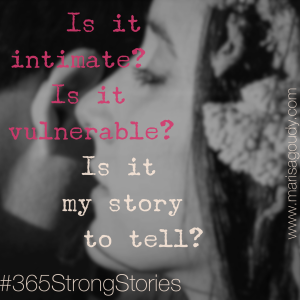 Writing a story a day is a mad, marvelous mission. Time constraints and the very real limitations on creative energies are valid concerns that might make you quit before you begin.
Another reason to think twice about asking your creative impulses to take the shape of something that can be fully expressed within a twenty-four hour period: the strong stories often want to take a lot longer to be conceived, born, and debuted in this strange, complex world.
Writing a story a day is a mad, marvelous mission. Time constraints and the very real limitations on creative energies are valid concerns that might make you quit before you begin.
Another reason to think twice about asking your creative impulses to take the shape of something that can be fully expressed within a twenty-four hour period: the strong stories often want to take a lot longer to be conceived, born, and debuted in this strange, complex world.
After two months of shaping and sharing these stories, I have finally started to recognize a story that needs to germinate. It would be a disservice to the narrative, the reader, and to me as a writer to force a certain kind of story to sing and perform before it can even cry out its own name.
When you force yourself to work on a deadline, however, it’s nearly impossible to abandon a story that’s three quarters written - especially if it took more than the hour you told it that it deserved.
Today, I wrestled with a story for a couple of hours only recognized that we both needed a rest when it bloomed past the 800 word mark. In a few days, I might be able to tell you if it was a lost cause journal entry with delusions of grandeur or if it’s something real and important that wants to reach beyond the scope of #365StrongStories.
How can you tell if your story needs to be nurtured in secret or if needs to be shoved (lovingly) into the light?
First, follow Brene Brown’s wisdom: is the story intimate or is it vulnerable?
Is the story full of gory details that you don’t want to describe or defend in conversation? That’s too intimate to share.
Or do you feel brave and proud and just the right amount of scared? That’s vulnerability and that’s at the core of every strong story.
And second, ask yourself whether it is your story to tell. If neither intimacy or vulnerability seem relevant to the equation, your story might be asking you to dive deeper or revisit it when you’ve really got something to say.
Sticky subjects that might stink of shame
The story I’m not ready to tell is about parent shaming. I’m very much inspired by Mercedes Samudio’s #EndParentShame work and I was triggered by an exchange I saw in a Facebook group today. It’s such an important topic that we need to start talking about across our communities.
Thing is, I felt nauseated rather than exhilarated as my fingers flew across the keyboard. I think I was more of a voyeur than an ethical memoirist describing her experiences.
All of those are signs that I’m sharing the wrong details about the wrong aspect of a greater truth. You, my story, and my integrity as a storyteller deserve more.
If it’s a strong story, it will wait.
It's my mission to help you discover and tell the strong stories that matter to you, your audience, and your business. Learn more about the You, Your Stories, and Your Audience eCourse.

Can you be vulnerable and write “I don’t know” on your business blog?
Sovereign Standard, Issue 34 The writer looks like she is sitting at a keyboard or scribbling furiously in a journal. She seems to be occupying the same space and time as everyone else in the room, but, in reality, she’s exploring territory that she can explain, but never let you view directly.
The writer looks like she is sitting at a keyboard or scribbling furiously in a journal. She seems to be occupying the same space and time as everyone else in the room, but, in reality, she’s exploring territory that she can explain, but never let you view directly.
Whether it’s fiction or theory or even marketing copy that comes from the heart, she’s deep in her own inner landscape. This marvelous space is only limited by the scope of her own imagination and knowledge.
This private world is not infinite. Instead, it’s an eternally elastic territory. The borders are pushed outward by everything she learns and by every experience that invites her to grow.
And yet, there are limits. The writer will reach her edge. Then what?
The Blogger’s Dilemma: The Question Without an Easy Answer
When I worked on the first draft of this week’s blog post, I found myself writing into a question without an answer.
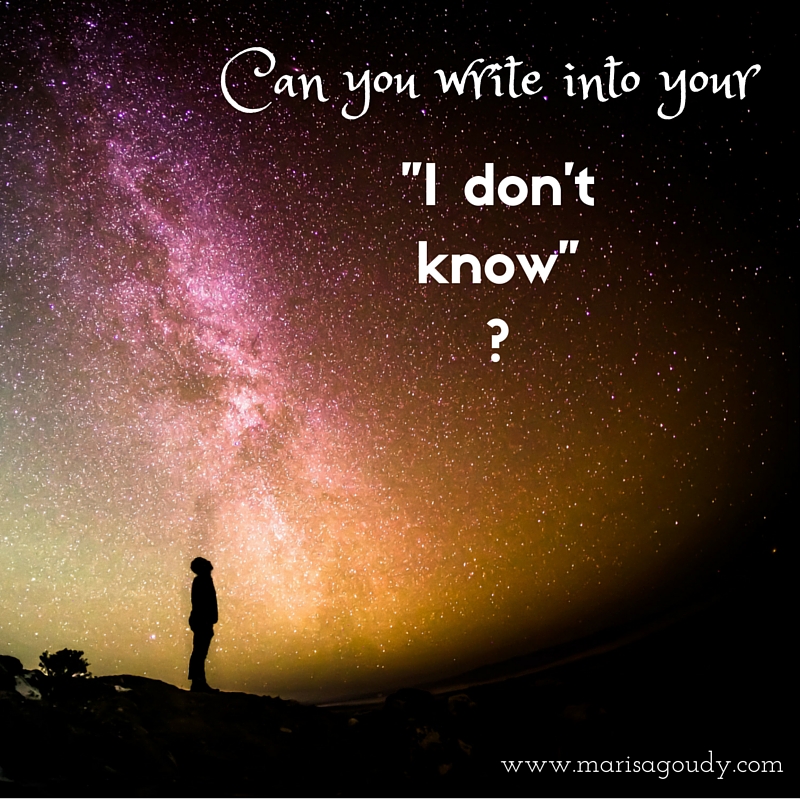 It was something so close to my “expertise” that I was shocked when I hit a big “I don’t know…”
It was something so close to my “expertise” that I was shocked when I hit a big “I don’t know…”
Often the best questions don’t have ready answers - that vast unknown is the seed of a book, a career, or a life's passion. By the same token, the best blog posts don't necessarily follow the "proven" formulas.
But, in my case, it felt like I should have an answer (and I don’t even let myself use the word should). After all, I was writing about storytelling and this was “just” a blog post… Finding myself at the edge of my frontier of knowledge was as unexpected as it was unsettling.
Sitting quietly in front of a Word doc, I felt uncertain and exposed.
I felt horribly vulnerable - even though no one ever needed to know that there was something really important about storytelling I couldn’t write about with ease.
And then, the magic of the writing practice kicked in: describing the view from my own intellectual edge became more important than the expertise I thought my readers would need.
This is the Vulnerability Business, right?
Last week’s post was about being in the vulnerability business. If you seek to transform lives and make this world more beautiful, bearable, or bold, you have a stall in the marketplace of vulnerability.
You hold space for your clients’ shame and uncertainties. And you strive to recognize vulnerability when you see it - starting with your own.
The writing process gives you a perfect window into your own vulnerabilities. After all, it’s about showing people how you organized ideas and crafted them to be understood by others. It's about being seen.
Something that wasn’t in the last post - writing can also expose what you might perceive as your “weaknesses.”
Remember, before Brené Brown taught us that “Vulnerability is the birthplace of love, belonging, joy, courage, empathy, and creativity,” most of us just equated vulnerability with weakness.
The gift of “I don’t know”
That unexpected “I don’t know” dropped me into the “fraud, fraud, fraud” pit. I’m sure I needn’t tell you that no decent writing has ever been produced in that despairing hell hole.
Let’s take a moment here to celebrate one of the many gifts of the writing practice: you can write your way through despair all the way to retrospect - sometimes in the same writing session!
Now, I can see “I don’t know” as a tremendous gift.
It’s an invitation to see things in a new way. It’s an opportunity to forgive myself for being a mere mortal who is still learning every day. It’s a chance to hit pause and do some really delicious research - and perhaps even read those books on writing that I love to buy but never have time to read (because it would eat into writing time, of course).
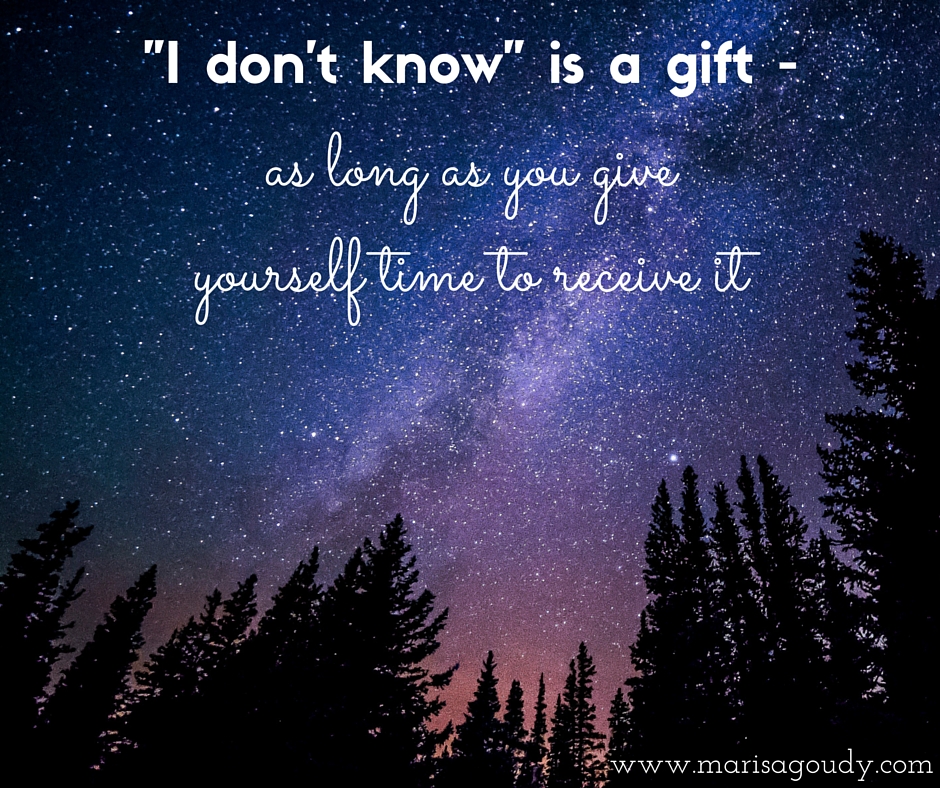 But what if you don’t have time receive the “I don’t know” gift?
But what if you don’t have time receive the “I don’t know” gift?
New perspective, self-acceptance, mindful pauses. Lots of people tell you how wonderful they are.
Truth is, it is hard to see all the opportunities in “I don’t know” when you simply don’t have the time to wander and wonder and expand the bounds of the known world.
There is only so much writing time per week. This time is not meant to be lavished on research or stumbling into terra incognita. It’s not meant to be spent on Facebook either, but that's another story.
So, what happens when you write yourself into an "I don't know" shaped corner but you just need to hit publish?
4 Ways a Writer Can Respond to an Unexpected “I Don’t Know”
Research. The universe just may be telling you that it IS ok to skip this week’s post and put your writing time into developing your own answer to that big, scary question.
(Admittedly, this week I told the universe I would get back to it about expanding my mind after I found a way to write something worth publishing, baked cupcakes for my 6 year-old’s birthday, and finished the outline for my new membership group. This may be an instance of “do as the writing coach says, not as she does.”)
Release. “Release” may be about skipping or delaying a post (see above). Losing sleep or publishing something that isn’t ready just because it’s supposed to be on the editorial calendar is never in your best interest.
(Personally, I find it almost impossible to break the publishing promise I've made to myself. I often choose to understand “realease” as letting go of the troublesome topic and allowing another idea to emerge.)
Repurpose. Look back at past posts, particularly material that appeared on old websites or on guest blog posts. Redo the intro and the conclusion and let yourself off the “must create original material” hook. Remember: this is always an option.
(Do you even remember what you wrote last year? Chances are there's real gold there. Looking back to your past posts isn't cheating - it's using all your resources wisely.)
Reach out. As I wrote this late into Wednesday night, I whined to my husband about being stuck in the blogging vortex. While I was happy that I had been able to release the original idea and repurpose the feelings that “I need to do more research” stirred up, I had well over 2000 words of wandering wonder. All I wanted was an intro, some useful content, and a compelling Invitation to Action! That was when the light went on - if only I had a writing coach!
All day long, I look at clients’ snarled up brilliance and help them pluck out the brightest, most evocative ideas and stories. It’s nearly always impossible to get perspective on your own work. If you can relate to this story, reach out to me and we’ll see how I can help you uncover your most brilliant thoughts.
*****
This week’s post was inspired by many factors including my big scary “I don’t know,” the conversation that last week’s vulnerability post has generated, and the Bravery Blogging Project I stumbled across this week (thanks, Molly!).
Illana Burk of Makeness Media is looking for her community to make “Real, original, difficult content.” I’m new to their world, but finding yet another circle of people who want to dive deep into an idea and risk writing outside the blogging “shoulds” stretches my mind in a wonderful new way. And it makes me feel like I can keep blogging about the “I don’t know” stuff and it encourages me to ask you to do the same.
The unexpected way your writing practice builds client loyalty and love
Sovereign Standard, Issue 33 “I feel really vulnerable right now,” she said. “I’ve never showed anyone but my husband a very first draft of my writing.”
“I feel really vulnerable right now,” she said. “I’ve never showed anyone but my husband a very first draft of my writing.”
We have a name to that feeling of being exposed thanks to the brilliant Brené. (Do I even need to mention her last name in this company?)
 As a culture, we’re learning that vulnerability is vital to connection and growth. It’s an essential skill to master if you want to make the world more beautiful, bearable, and bold.
As a culture, we’re learning that vulnerability is vital to connection and growth. It’s an essential skill to master if you want to make the world more beautiful, bearable, and bold.
And yet, actually doing the stuff that puts your vulnerability skills to the test? Well, that’s another story.
Honoring your clients' vulnerability - and bravery
The client I quote above reminded me that sharing your writing - especially what Anne Lamott famously calls the “shitty first draft” - can be a terrifying experience.
Pressing “publish” and sending your words into the public arena isn’t the only thing that’s scary. Just sending it to someone who has earned your trust, like a writing coach, can give you the whim-whams.
Even if you want me to look more deeply at your writing. Even if you want me to question your logic and rework a paragraph that took you 45 minutes to write. Even when you trust me and trust our co-creative writing process, you still may shudder when I say "so, I read your piece..."
Almost everyone wrestles with the writing shame that was instilled in them by dismissive English teachers, unholy nuns, or grammarian grandmothers. I have to remind myself - often - that I’m pushing people into uncomfortable spaces by simply doing my job.
Are you in the vulnerability business too?
My dance with these beloved, vulnerable writers becomes even more complex since my clients themselves are in the vulnerability business.
And some of them never knew it was going to be part of the entrepreneurial ride.
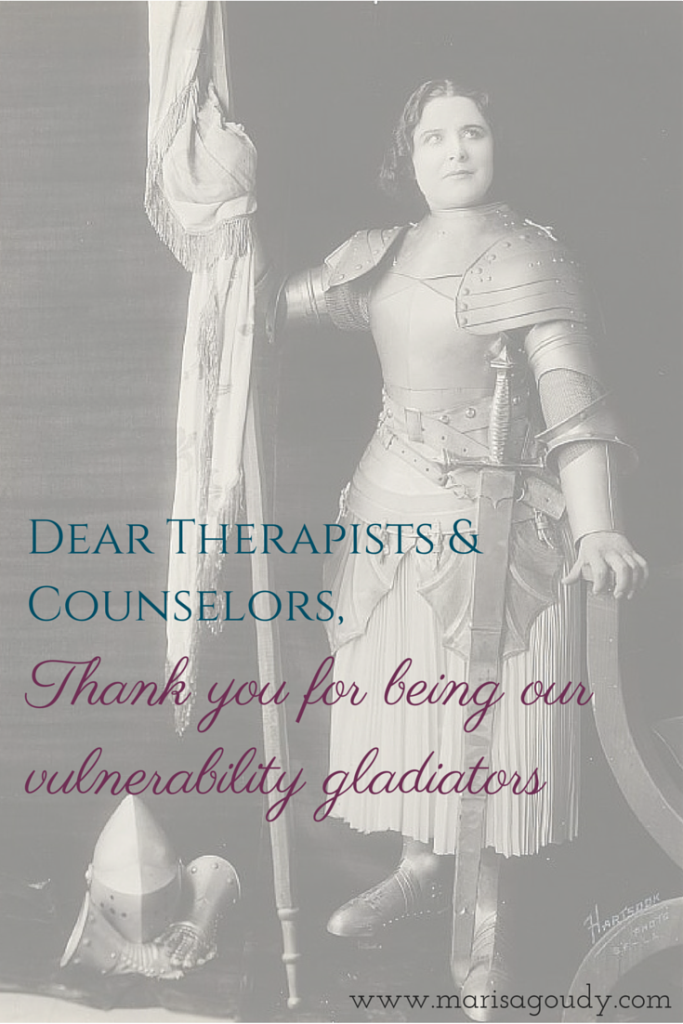 Therapists & Counselors, thank you for being our vulnerability gladiators
Therapists & Counselors, thank you for being our vulnerability gladiators
Therapists, of course, are schooled in the art and science of vulnerability. You specialize in emotional exposure - and how that tends to make people react or shut down.
Thank goodness we have you, dear counselors! I envision you there doing your brilliant work in the green room of the Daring Greatly "arena.”
Creative Entrepreneurs, you know you have a place in the arena too, right? Suit up!
And then there’s the rest of us creative entrepreneurs who learn from Brené Brown’s books. We look to the thought leaders (and bloggers!) who expose the crazy-sexy-scary underbelly of being alive and putting ourselves out there.
We creative entrepreneurs are not necessarily trained in the intricacies of the human psyche, but we still need to recognize we have a role to play in this arena.
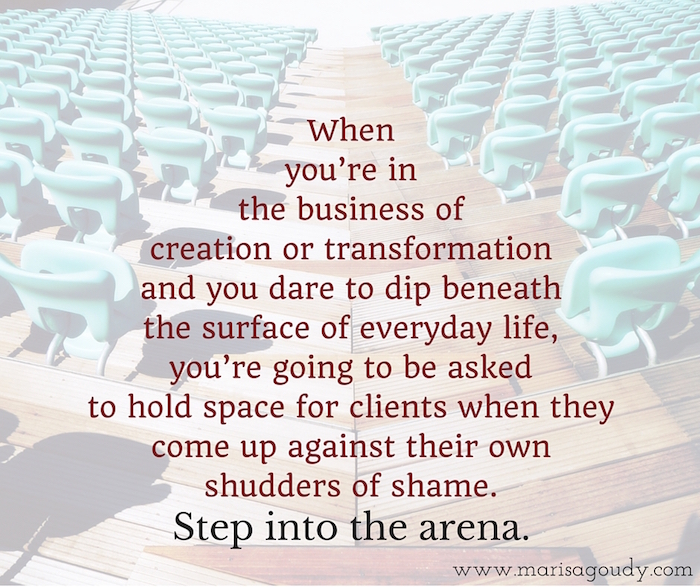 When you’re in the business of creation or transformation and you dare to dip beneath the surface of everyday life, you’re going to be asked to hold space for clients when they come up against their own shudders of shame.
When you’re in the business of creation or transformation and you dare to dip beneath the surface of everyday life, you’re going to be asked to hold space for clients when they come up against their own shudders of shame.
Support clients in their most vulnerable moments and help them make real, positive change… When you do that, you’re performing a service that’s so much more valuable than whatever you say you do on your website.
When you hold space in that way you’re creating a long term client and a forever fan.
How can you make vulnerability one of your greatest assets?
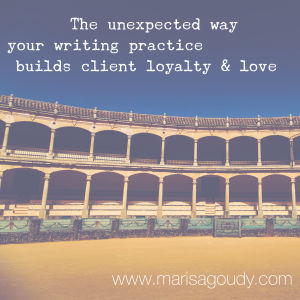 If being “that person” who can hold space for a client when she feels most exposed is how you earn the trust that builds a practice and a business, how can you get better at it?
If being “that person” who can hold space for a client when she feels most exposed is how you earn the trust that builds a practice and a business, how can you get better at it?
Start by recognizing what makes you feel vulnerable. Start with what feels risky. Start with your writing.
4 Key Lessons in Vulnerability You Can Learn From Your Own Writing Practice
- Recognize that you are stepping into the arena whenever you publish a blog post. Congratulate yourself for that.
- Realize that showing one focused reader something that you have written may feel a lot harder than sending it to a million faceless internet surfers.
- Acknowledge that your writer’s block is about more than time constraints and a hatred of grammar… it's likely rooted in that tricky mix of “please see me” and “eek! stop looking at me!”
- Notice when you’re asking your readers to be vulnerable. You’ll hone your vulnerability super powers when you become aware of the content that pushes readers out of their comfort zone.
Simply put, when you know your own vulnerabilities more intimately, you’ll be better able to detect them and honor them in others. People love it when you do that, you know. Think you might be ready to entrust me with your stories and your writing practice? Learn more about the writing coaching relationship.
I'll leave you with my favorite working definition of vulnerability by the brilliant Ahri Golden. Soak in these words. Put them into practice.
Vulnerability In the space between you and me Vulnerability is power Vulnerability in the space between you and me Vulnerability is the opposite of weak

